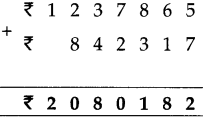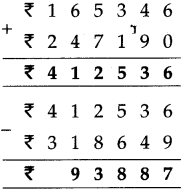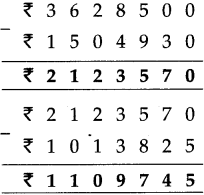Balbharti Maharashtra Board Class 5 Maths Solutions
Chapter 3 Addition and Subtraction Problem Set 13 Textbook Exercise Important Questions and Answers.
Solve the following mixed word problems:
Question 1.
The Forest Department planted 23,078 trees of khair, 19,476 of behada besides trees of several other kinds. If the Department planted 50,000 trees altogether, how many trees were neither of khair nor of behada?
Solution:
2 3 0 7 8 Trees of khair
+
1 9 4 7 6 Trees of behada
4 2 5 5 4 Trees of khair and behada

5 0 0 0 0 Total trees planted
–
4 2 5 5 4 Khair and behada trees planted
7 4 4 6 Other kind of trees planted

Answer:
7,446 trees planted other than khair and behada trees.

Question 2.
A city has a population of 37,04,926. If this includes 11,24,069 men and 10,96,478 women, what is the number of children in the city?
Solution:
1 1 2 4 0 6 9 Men
+
1 0 9 6 4 7 8 Women
2 2 2 0 5 4 7 Total of men and women

3 7 0 4 9 2 6 Total population
–
2 2 2 0 5 4 7 Men and women
1 4 8 4 3 7 9 No. of children

Answer:
Number of children in the city is 14,84,379.
Question 3.
The management of a certain factory had 25,40,600 rupees in the labour welfare fund. From this fund, 12,37,865 rupees were used for medical expenses, 8,42,317 rupees were spent on the education of the workers’ children and the remaining was put aside for a canteen. How much money was put aside for the canteen?
Solution:
₹ 1 2 3 7 8 6 5 Medical expenses
₹ 8 4 2 3 1 7 Education for workers children
₹ 2080182 Spent for medical and education.
₹ 2 5 4 0 6 0 0 Labour welfare fund
₹ 2 0 8 0 1 8 2 Medical & education
₹ 4 6 0 4 1 8 Kept a side for canteen


Answer:
₹ 4,60,418 put aside for the canteen,

Question 4.
For a three-day cricket match, 13,608 tickets were sold on the first day and 8,955 on the second day. If, altogether, 36,563 tickets were sold in three days, how many were sold on the third day?
Solution:
1 3 6 0 8 Tickets sold on 1st day
+
8 9 5 5 Ticket sold on 2nd day
2 2 5 6 3 Tickets sold on 1st and 2nd day
3 6 5 6 3 Tickets sold in 3 days
–
2 2 5 6 3 Tickets sold in 2 days
1 4 0 0 0 Tickets sold on 3rd day


Answer:
₹ 14,000 tickets sold on the third day.
Addition and Subtraction Problem Set 13 Additional Important Questions and Answers
Solve the following mixed word problems:
Question 1.
A man had ₹ 1,65,346 in the bank. He deposited ₹ 2,47,190 in the bank, then he gave a cheque of ₹ 3,18,649 to Ashutosh. How much’is the balance in the bank now?
Solution:
₹ 1 6 5 3 4 6 Had in the bank
+
₹ 2 4 7 1 9 0 Deposited in the bank
₹ 4 1 2 5 3 6 Total balance
₹ 4 1 2 5 3 6 Total
–
₹ 3 1 8 6 4 9 Gave to Ashutosh
₹ 9 3 8 8 7 Balance in the bank

Answer:
Balance in the bank ₹ 93,887.

Question 2.
Vighanesh had ₹ 36,28,500 from this amount he gave ₹ 15,04,930 to his wife and ₹ 10,13,825to his son. How much amount left with him?
Solution:
₹ 3 6 2 8 5 0 0 Vighanesh had
–
₹ 1 5 0 4 9 3 0 given to wife
₹ 2 1 2 3 5 7 0 Total
₹ 2 1 2 3 5 7 0 Balance
–
₹ 1 0 1 3 8 2 5 Gave to son
₹ 1 1 0 9 7 4 5 Left with him

Answer:
₹ 11,09,745 left with Vighanesh.
Question 2.
Add the following:
(1) 3 0 5 8 3
+
1 2 3 2 9
_____________
_____________
Answer:
42912
(2) 4 5 3 7 8
+
4 4 6 2 2
_____________
_____________
Answer:
90000

(3) 7 5 0 3 8
+
1 7 4 1 8
_____________
_____________
Answer:
92456
(4) 2 2 1 0 5
+
3 9 6 5 1
_____________
_____________
Answer:
61756
Question 3.
Add the following:
(1) 63,348 + 74,35,631
(2) 9,65,247 + 3,28,925
(3) 7,61,856 + 1,45,437
(4) 33,23,057 + 35,28,436
(5) 3,451 + 62,507 + 3,40,678
(6) 48 + 38,41,705 + 98,314
(7) 25,38,781 + 328 + 16,508
(8) 29,145 + 40,37,615 + 8,70,469
Answer:
(1) 74,98,979
(2) 12,94,172
(3) 9,07,293
(4) 68,51,493
(5) 4,06,636
(6) 39,40,065
(7) 25,55,617
(8) 49,37,229

Question 4.
Match the equal numbers in three columns
Answer:
(1) b – iv
(2) d – iii
(3) a – ii
(4) c – i
Question 5.
Subtract the following:
(1) 7 6 3 8 5
–
5 7 6 3 7
____________
____________
Answer:
18,748
(2) 5 6 0 4 7
–
3 2 3 7 8
____________
____________
Answer:
23,669

(3) 8 2 3 5 6
–
4 1 5 6 3 9
____________
____________
Answer:
36,927
(4) 4 5 4 2 9
–
3 5 9 6 8
____________
____________
Answer:
04,788
(5) 7 4 3 5 0 8
–
4 1 5 6 3 9
____________
____________
Answer:
3,27,869
(6) 2 4 8 1 3 6 7
–
1 7 8 4 2 7 8
____________
____________
Answer:
6,97,089

(7) 5 9 3 1 6 6 5
–
4 3 6 5 7 4 9
____________
____________
Answer:
19,79,109
(8) 8 0 5 1 4 3 6
–
4 3 6 5 7 4 9
____________
____________
Answer:
36,85,687

Question 6.
Solve the following examples :
(1) (a) 64,83,217 – 23,94,128 + 16,84,579
(b) 36,94,523 + 28,17,689 – 50,49,876
(c) 83,47,215 – 38,58,386 – 25,74,978
(d) 3,72,190 + 2,18,310 – 1,56,900
(e) 36,00,800 – 27,91,978 – 3,01,005
(f) 51,51,515 – 5,55,555 + 6,66,006
Answer:
(a) 57,73,668
(b) 14,62,336
(c) 19,13,851
(d) 4,33,600
(e) 5,07,817
(f) 52,61,966
Chapter 3 Addition and Subtraction Problem Set 13 Textbook Exercise Important Questions and Answers.
Solve the following mixed word problems:
Question 1.
The Forest Department planted 23,078 trees of khair, 19,476 of behada besides trees of several other kinds. If the Department planted 50,000 trees altogether, how many trees were neither of khair nor of behada?
Solution:
2 3 0 7 8 Trees of khair
+
1 9 4 7 6 Trees of behada
4 2 5 5 4 Trees of khair and behada

5 0 0 0 0 Total trees planted
–
4 2 5 5 4 Khair and behada trees planted
7 4 4 6 Other kind of trees planted

Answer:
7,446 trees planted other than khair and behada trees.
Question 2.
A city has a population of 37,04,926. If this includes 11,24,069 men and 10,96,478 women, what is the number of children in the city?
Solution:
1 1 2 4 0 6 9 Men
+
1 0 9 6 4 7 8 Women
2 2 2 0 5 4 7 Total of men and women

3 7 0 4 9 2 6 Total population
–
2 2 2 0 5 4 7 Men and women
1 4 8 4 3 7 9 No. of children

Answer:
Number of children in the city is 14,84,379.
Question 3.
The management of a certain factory had 25,40,600 rupees in the labour welfare fund. From this fund, 12,37,865 rupees were used for medical expenses, 8,42,317 rupees were spent on the education of the workers’ children and the remaining was put aside for a canteen. How much money was put aside for the canteen?
Solution:
₹ 1 2 3 7 8 6 5 Medical expenses
₹ 8 4 2 3 1 7 Education for workers children
₹ 2080182 Spent for medical and education.
₹ 2 5 4 0 6 0 0 Labour welfare fund
₹ 2 0 8 0 1 8 2 Medical & education
₹ 4 6 0 4 1 8 Kept a side for canteen


Answer:
₹ 4,60,418 put aside for the canteen,
Question 4.
For a three-day cricket match, 13,608 tickets were sold on the first day and 8,955 on the second day. If, altogether, 36,563 tickets were sold in three days, how many were sold on the third day?
Solution:
1 3 6 0 8 Tickets sold on 1st day
+
8 9 5 5 Ticket sold on 2nd day
2 2 5 6 3 Tickets sold on 1st and 2nd day
3 6 5 6 3 Tickets sold in 3 days
–
2 2 5 6 3 Tickets sold in 2 days
1 4 0 0 0 Tickets sold on 3rd day


Answer:
₹ 14,000 tickets sold on the third day.
Addition and Subtraction Problem Set 13 Additional Important Questions and Answers
Solve the following mixed word problems:
Question 1.
A man had ₹ 1,65,346 in the bank. He deposited ₹ 2,47,190 in the bank, then he gave a cheque of ₹ 3,18,649 to Ashutosh. How much’is the balance in the bank now?
Solution:
₹ 1 6 5 3 4 6 Had in the bank
+
₹ 2 4 7 1 9 0 Deposited in the bank
₹ 4 1 2 5 3 6 Total balance
₹ 4 1 2 5 3 6 Total
–
₹ 3 1 8 6 4 9 Gave to Ashutosh
₹ 9 3 8 8 7 Balance in the bank

Answer:
Balance in the bank ₹ 93,887.
Question 2.
Vighanesh had ₹ 36,28,500 from this amount he gave ₹ 15,04,930 to his wife and ₹ 10,13,825to his son. How much amount left with him?
Solution:
₹ 3 6 2 8 5 0 0 Vighanesh had
–
₹ 1 5 0 4 9 3 0 given to wife
₹ 2 1 2 3 5 7 0 Total
₹ 2 1 2 3 5 7 0 Balance
–
₹ 1 0 1 3 8 2 5 Gave to son
₹ 1 1 0 9 7 4 5 Left with him

Answer:
₹ 11,09,745 left with Vighanesh.
Question 2.
Add the following:
(1) 3 0 5 8 3
+
1 2 3 2 9
_____________
_____________
Answer:
42912
(2) 4 5 3 7 8
+
4 4 6 2 2
_____________
_____________
Answer:
90000
(3) 7 5 0 3 8
+
1 7 4 1 8
_____________
_____________
Answer:
92456
(4) 2 2 1 0 5
+
3 9 6 5 1
_____________
_____________
Answer:
61756
Question 3.
Add the following:
(1) 63,348 + 74,35,631
(2) 9,65,247 + 3,28,925
(3) 7,61,856 + 1,45,437
(4) 33,23,057 + 35,28,436
(5) 3,451 + 62,507 + 3,40,678
(6) 48 + 38,41,705 + 98,314
(7) 25,38,781 + 328 + 16,508
(8) 29,145 + 40,37,615 + 8,70,469
Answer:
(1) 74,98,979
(2) 12,94,172
(3) 9,07,293
(4) 68,51,493
(5) 4,06,636
(6) 39,40,065
(7) 25,55,617
(8) 49,37,229
Question 4.
Match the equal numbers in three columns
| Column (A) | Column (B) | Column (C) |
| (1) Thirteen thousand plus two hundred | (a) 304 + 500 | (i) 80,704 |
| (2) Eight thousand plus seventy | (b) 13,000 + 200 | (ii) 804 |
| (3) Three hundred and four plus five hundred | (c) 80,000 + 704 | (iii) 8070 |
| (4) Eighty thousand plus seven hundred and four | (d) 8,000 + 70 | (iv) 13,200 |
(1) b – iv
(2) d – iii
(3) a – ii
(4) c – i
Question 5.
Subtract the following:
(1) 7 6 3 8 5
–
5 7 6 3 7
____________
____________
Answer:
18,748
(2) 5 6 0 4 7
–
3 2 3 7 8
____________
____________
Answer:
23,669
(3) 8 2 3 5 6
–
4 1 5 6 3 9
____________
____________
Answer:
36,927
(4) 4 5 4 2 9
–
3 5 9 6 8
____________
____________
Answer:
04,788
(5) 7 4 3 5 0 8
–
4 1 5 6 3 9
____________
____________
Answer:
3,27,869
(6) 2 4 8 1 3 6 7
–
1 7 8 4 2 7 8
____________
____________
Answer:
6,97,089
(7) 5 9 3 1 6 6 5
–
4 3 6 5 7 4 9
____________
____________
Answer:
19,79,109
(8) 8 0 5 1 4 3 6
–
4 3 6 5 7 4 9
____________
____________
Answer:
36,85,687
Question 6.
Solve the following examples :
(1) (a) 64,83,217 – 23,94,128 + 16,84,579
(b) 36,94,523 + 28,17,689 – 50,49,876
(c) 83,47,215 – 38,58,386 – 25,74,978
(d) 3,72,190 + 2,18,310 – 1,56,900
(e) 36,00,800 – 27,91,978 – 3,01,005
(f) 51,51,515 – 5,55,555 + 6,66,006
Answer:
(a) 57,73,668
(b) 14,62,336
(c) 19,13,851
(d) 4,33,600
(e) 5,07,817
(f) 52,61,966